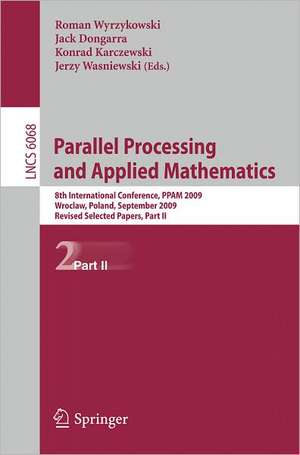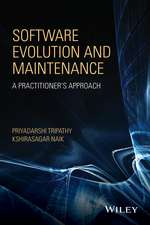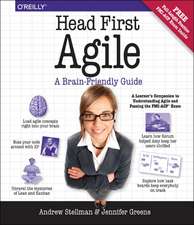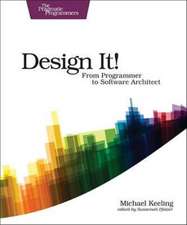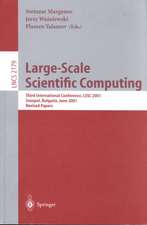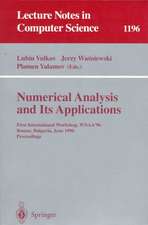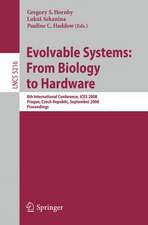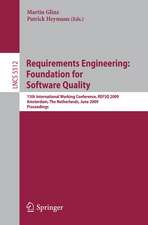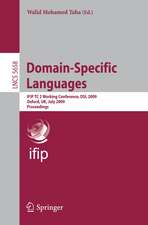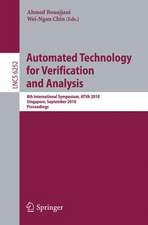Parallel Processing and Applied Mathematics, Part II: 8th International Conference, PPAM 2009, Wroclaw, Poland, September 13-16, 2009, Proceedings: Lecture Notes in Computer Science, cartea 6068
Editat de Roman Wyrzykowski, Jack Dongarra, Konrad Karczewski, Jerzy Wasniewskien Limba Engleză Paperback – 12 iul 2010
| Toate formatele și edițiile | Preț | Express |
|---|---|---|
| Paperback (2) | 349.40 lei 6-8 săpt. | |
| Springer Berlin, Heidelberg – 12 iul 2010 | 655.85 lei 3-5 săpt. | |
| Springer Berlin, Heidelberg – 7 iul 2012 | 349.40 lei 6-8 săpt. |
Din seria Lecture Notes in Computer Science
- 20%
 Preț: 1061.55 lei
Preț: 1061.55 lei - 20%
 Preț: 307.71 lei
Preț: 307.71 lei - 20%
 Preț: 438.69 lei
Preț: 438.69 lei - 20%
 Preț: 579.30 lei
Preț: 579.30 lei -
 Preț: 410.88 lei
Preț: 410.88 lei - 17%
 Preț: 427.22 lei
Preț: 427.22 lei - 20%
 Preț: 596.46 lei
Preț: 596.46 lei - 15%
 Preț: 448.04 lei
Preț: 448.04 lei - 20%
 Preț: 353.50 lei
Preț: 353.50 lei -
 Preț: 389.49 lei
Preț: 389.49 lei - 20%
 Preț: 309.90 lei
Preț: 309.90 lei - 20%
 Preț: 645.28 lei
Preț: 645.28 lei - 20%
 Preț: 763.23 lei
Preț: 763.23 lei - 15%
 Preț: 580.46 lei
Preț: 580.46 lei - 20%
 Preț: 310.28 lei
Preț: 310.28 lei - 20%
 Preț: 655.02 lei
Preț: 655.02 lei - 20%
 Preț: 1183.14 lei
Preț: 1183.14 lei - 20%
 Preț: 340.32 lei
Preț: 340.32 lei -
 Preț: 449.57 lei
Preț: 449.57 lei - 20%
 Preț: 591.51 lei
Preț: 591.51 lei - 18%
 Preț: 938.83 lei
Preț: 938.83 lei - 20%
 Preț: 337.00 lei
Preț: 337.00 lei - 20%
 Preț: 649.50 lei
Preț: 649.50 lei - 20%
 Preț: 607.40 lei
Preț: 607.40 lei - 20%
 Preț: 1414.79 lei
Preț: 1414.79 lei - 20%
 Preț: 1024.44 lei
Preț: 1024.44 lei - 20%
 Preț: 583.40 lei
Preț: 583.40 lei - 20%
 Preț: 453.32 lei
Preț: 453.32 lei - 20%
 Preț: 575.49 lei
Preț: 575.49 lei - 20%
 Preț: 1075.26 lei
Preț: 1075.26 lei - 20%
 Preț: 585.88 lei
Preț: 585.88 lei - 20%
 Preț: 825.93 lei
Preț: 825.93 lei - 17%
 Preț: 360.20 lei
Preț: 360.20 lei - 20%
 Preț: 763.23 lei
Preț: 763.23 lei - 20%
 Preț: 340.32 lei
Preț: 340.32 lei - 20%
 Preț: 504.58 lei
Preț: 504.58 lei - 20%
 Preț: 369.13 lei
Preț: 369.13 lei - 20%
 Preț: 580.93 lei
Preț: 580.93 lei - 20%
 Preț: 343.62 lei
Preț: 343.62 lei - 20%
 Preț: 350.21 lei
Preț: 350.21 lei - 20%
 Preț: 583.40 lei
Preț: 583.40 lei - 20%
 Preț: 583.40 lei
Preț: 583.40 lei - 15%
 Preț: 438.59 lei
Preț: 438.59 lei - 20%
 Preț: 341.95 lei
Preț: 341.95 lei - 20%
 Preț: 238.01 lei
Preț: 238.01 lei - 20%
 Preț: 538.30 lei
Preț: 538.30 lei
Preț: 655.85 lei
Preț vechi: 819.82 lei
-20% Nou
Puncte Express: 984
Preț estimativ în valută:
125.51€ • 136.29$ • 105.43£
125.51€ • 136.29$ • 105.43£
Carte disponibilă
Livrare economică 01-15 aprilie
Preluare comenzi: 021 569.72.76
Specificații
ISBN-13: 9783642144028
ISBN-10: 3642144020
Pagini: 596
Ilustrații: XXIV, 596 p. 272 illus.
Greutate: 0.7 kg
Ediția:2010
Editura: Springer Berlin, Heidelberg
Colecția Springer
Seriile Lecture Notes in Computer Science, Theoretical Computer Science and General Issues
Locul publicării:Berlin, Heidelberg, Germany
ISBN-10: 3642144020
Pagini: 596
Ilustrații: XXIV, 596 p. 272 illus.
Greutate: 0.7 kg
Ediția:2010
Editura: Springer Berlin, Heidelberg
Colecția Springer
Seriile Lecture Notes in Computer Science, Theoretical Computer Science and General Issues
Locul publicării:Berlin, Heidelberg, Germany
Public țintă
ResearchCuprins
Workshop on Scheduling for Parallel Computing (SPC 2009).- Fully Polynomial Time Approximation Schemes for Scheduling Divisible Loads.- Semi-online Preemptive Scheduling: Study of Special Cases.- Fast Multi-objective Reschulding of Grid Jobs by Heuristics and Evolution.- Comparison of Program Task Scheduling Algorithms for Dynamic SMP Clusters with Communication on the Fly.- Study on GEO Metaheuristic for Solving Multiprocessor Scheduling Problem.- Online Scheduling of Parallel Jobs on Hypercubes: Maximizing the Throughput.- The Third Workshop on Language-Based Parallel Programming Models (WLPP 2009).- Verification of Causality Requirements in Java Memory Model Is Undecidable.- A Team Object for CoArray Fortran.- On the Definition of Service Abstractions for Parallel Computing.- The Second Workshop on Performance Evaluation of Parallel Applications on Large-Scale Systems.- Performance Debugging of Parallel Compression on Multicore Machines.- Energy Considerations for Divisible Load Processing.- Deskilling HPL.- Monitoring of SLA Parameters within VO for the SOA Paradigm.- A Role-Based Approach to Self-healing in Autonomous Monitoring Systems.- Parallel Performance Evaluation of MIC(0) Preconditioning Algorithm for Voxel ?FE Simulation.- Parallel HAVEGE.- The Fourth Grid Applications and Middleware Workshop (GAMW 2009).- UNICORE Virtual Organizations System.- Application of ADMIRE Data Mining and Integration Technologies in Environmental Scenarios.- Performance Based Matchmaking on Grid.- Replica Management for National Data Storage.- Churn Tolerant Virtual Organization File System for Grids.- The Fourth Workshop on Large Scale Computations on Grids (LaSCoG 2009).- Quasi-random Approach in the Grid Application SALUTE.- Mobile Agents for Management of Native Applicationsin GRID.- Leveraging Complex Event Processing for Grid Monitoring.- Designing Execution Control in Programs with Global Application States Monitoring.- Distributed MIND – A New Processing Model Based on Mobile Interactive Documents.- A Framework for Observing Dynamics of Agent-Based Computations.- HyCube: A DHT Routing System Based on a Hierarchical Hypercube Geometry.- Workshop on Parallel Computational Biology (PBC 2009).- Accuracy and Performance of Single versus Double Precision Arithmetics for Maximum Likelihood Phylogeny Reconstruction.- Automated Design of Assemblable, Modular, Synthetic Chromosomes.- GPU Parallelization of Algebraic Dynamic Programming.- Parallel Extreme Ray and Pathway Computation.- Minisymposium on Applications of Parallel Computation in Industry and Engineering.- Parallelized Transient Elastic Wave Propagation in Orthotropic Structures.- Parallel Numerical Solver for Modelling of Electromagnetic Properties of Thin Conductive Layers.- Numerical Health Check of Industrial Simulation Codes from HPC Environments to New Hardware Technologies.- Application of Parallel Technologies to Modeling Lithosphere Dynamics and Seismicity.- AMG for Linear Systems in Engine Flow Simulations.- Parallel Implementation of a Steady State Thermal and Hydraulic Analysis of Pipe Networks in OpenMP.- High-Performance Ocean Color Monte Carlo Simulation in the Geo-info Project.- EULAG Model for Multiscale Flows – Towards the Petascale Generation of Mesoscale Numerical Weather Prediction.- Parallel Implementation of Particle Tracking and Collision in a Turbulent Flow.- A Distributed Multilevel Ant-Colony Approach for Finite Element Mesh Decomposition.- Minisymposium on Interval Analysis.- Toward Definition of Systematic Criteria for the Comparison of VerifiedSolvers for Initial Value Problems.- Fuzzy Solution of Interval Nonlinear Equations.- Solving Systems of Interval Linear Equations with Use of Modified Interval Division Procedure.- Remarks on Algorithms Implemented in Some C++ Libraries for Floating-Point Conversions and Interval Arithmetic.- An Interval Method for Seeking the Nash Equilibria of Non-cooperative Games.- From Gauging Accuracy of Quantity Estimates to Gauging Accuracy and Resolution of Measuring Physical Fields.- A New Method for Normalization of Interval Weights.- A Global Optimization Method for Solving Parametric Linear Systems Whose Input Data Are Rational Functions of Interval Parameters.- Direct Method for Solving Parametric Interval Linear Systems with Non-affine Dependencies.- Workshop on Complex Collective Systems.- Evaluating Lava Flow Hazard at Mount Etna (Italy) by a Cellular Automata Based Methodology.- Application of CoSMoS Parallel Design Patterns to a Pedestrian Simulation.- Artificial Intelligence of Virtual People in CA FF Pedestrian Dynamics Model.- Towards the Calibration of Pedestrian Stream Models.- Two Concurrent Algorithms of Discrete Potential Field Construction.- Frustration and Collectivity in Spatial Networks.- Weakness Analysis of a Key Stream Generator Based on Cellular Automata.- Fuzzy Cellular Model for On-Line Traffic Simulation.- Modeling Stop-and-Go Waves in Pedestrian Dynamics.- FPGA Realization of a Cellular Automata Based Epidemic Processor.- Empirical Results for Pedestrian Dynamics at Bottlenecks.- Properties of Safe Cellular Automata-Based S-Boxes.
Caracteristici
Up-to-date results Fast track conference proceedings State-of-the-art report
